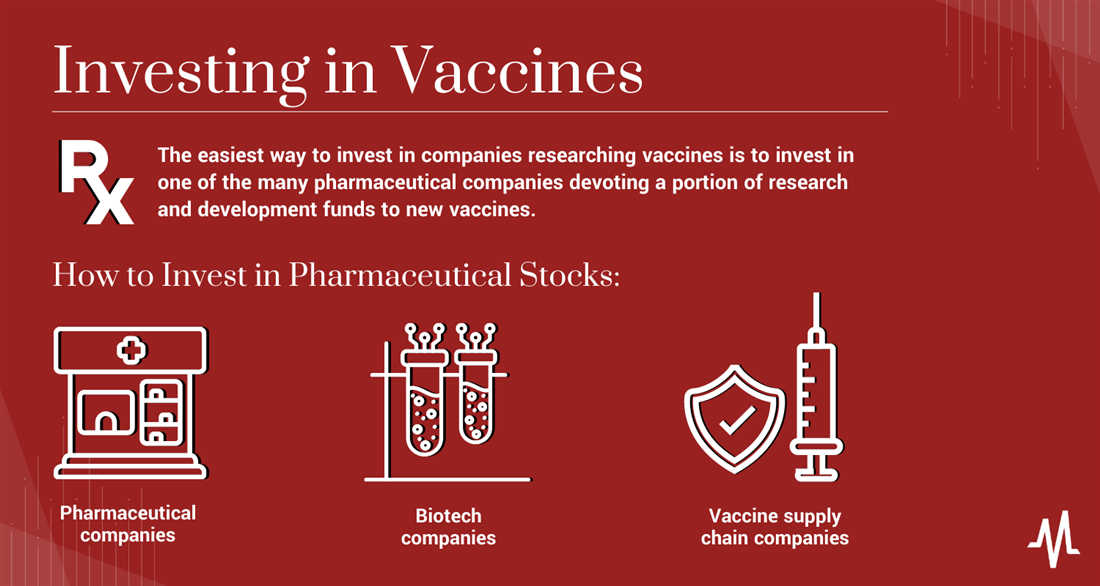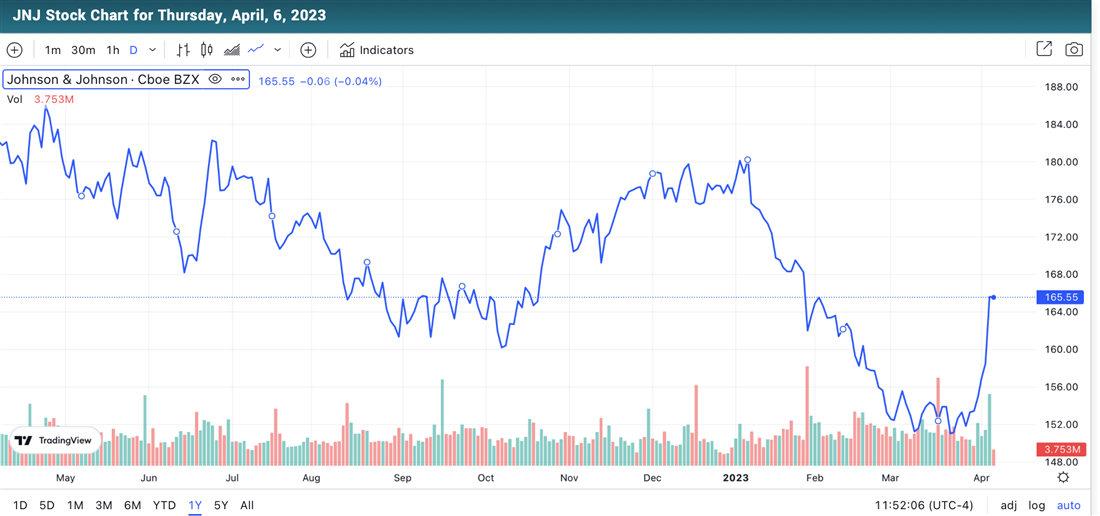Ready to learn more about pharmaceutical and COVID vaccine stocks? Read on to learn more about multiple methods to invest in medical developments and what might have been the best stocks to buy during coronavirus.
Overview of Vaccine Stocks
A vaccine stock is associated with a company that produces vaccines, researches new vaccine technologies and provides vaccine transportation services. Vaccine development typically involves extensive research and clinical trials, which federal governments may fund partially.
Once regulatory agencies have approved a vaccine, it can be marketed and sold to healthcare providers and patients. Exploring a healthcare stock list will expose you to some of the largest players in the vaccine industry.
Why Invest in Vaccine Stocks?
Vaccines are crucial tools used to treat and prevent hundreds of fatal illnesses and conditions. Investing in a pharmaceutical or biotech company involved in drug and gene therapy development can produce strong returns if the company passes successful trials.
The demand for vaccines will continue to grow in the coming years as the global population continues to age. It can provide long-term growth potential for vaccine stocks, many of which also invest heavily in other sectors of the healthcare sphere. It may also offer diversification for your portfolio within the healthcare industry.

3 Ways to Invest in Vaccines
While you can no longer invest in a COVID-19 stock before the vaccination's development, many other healthcare-centered stocks focus on vaccine development.
Pharmaceutical Stocks
The easiest way to invest in companies researching vaccines is to invest in one of the many pharmaceutical companies devoting a portion of research and development funds to new vaccines. Large pharmaceutical companies such as Pfizer Inc. NYSE: PFE and Johnson & Johnson NYSE: JNJ have been developing vaccines for decades.
 Major pharmaceutical providers like Johnson & Johnson have rebounded since the onset of the COVID-19 pandemic.
Major pharmaceutical providers like Johnson & Johnson have rebounded since the onset of the COVID-19 pandemic.
Major pharmaceutical providers have extensive research and development budgets, allowing them to simultaneously work on vaccines for various incurable illnesses. Major pharmaceutical companies may also invest heavily in clinical trials, regulatory compliance, and marketing efforts to get their products approved and reach patients needing them.
Pharmaceutical companies may partner with the federal government to streamline or improve vaccine development. For example, the United States spent more than $18 billion on COVID-19 vaccine research and development. You can find a list of the best pharmaceutical stocks on MarketBeat.
Biotech Companies
Biotech companies use advanced biotechnology techniques to create vaccines, which can involve genetically engineering viruses or bacteria. They may invest in research and development like pharmaceutical companies but devote most research to novel medical solutions using human genomes. Major companies in the biotech sphere include Moderna Inc. NASDAQ: MRNA and Novavax Inc. NASDAQ: NVAX.
Biotech stocks became popular among stock traders looking to invest in a COVID vaccine, as the virus seems unresponsive to known vaccine creation methods. For example, Moderna shot to the top of the list of best stocks to buy during the coronavirus, thanks to its breakthrough COVID-19 vaccine. Moderna's vaccine is based on mRNA (messenger RNA) technology, which introduces a small piece of genetic material called mRNA into the body. This advancement could not have been possible without biotech companies' capacity to isolate RNA from a sample of human DNA.
While the cure for COVID-19 is no longer biotech companies' primary area of research, many continue to explore gene therapies to develop new treatment strategies. Future research areas in the biotech sphere include developing gene therapies for neurological disorders and gene editing projects. You can learn more about how to invest in biotech stocks and possibly COVID stocks.
Vaccine Supply Chain Companies
Vaccinations often use living compounds or severely weakened forms of diseases to create vaccines. This creates a supply chain problem regarding product distribution, as vaccines usually need to be kept in a controlled environment, including at a specific temperature during transportation.
Vaccine supplies specialize in transporting and storing temperature-sensitive products, including vaccines. These companies use specialized refrigerated trucks, containers and warehouses to ensure that vaccines stay at the proper temperature during transportation and storage. While they may not seem as important as pharmaceutical and biotech companies, vaccine supply chain providers play a crucial role in the healthcare system. Examples of vaccine supply chain companies include AmerisourceBergen Corp. NYSE: ABC and Cryoport Inc. NASDAQ: CYRX.
How to Invest in Vaccine Stocks
If you've invested in the stock market before, you'll find that buying and selling vaccine stock is the same as buying any other type of tradable asset. If you're unfamiliar with investing, take the following steps to start your foray into the healthcare system and vaccines stock.
Step 1: Explore healthcare stocks.
As we mentioned above, multiple types of companies are involved in manufacturing and distributing vaccines. Start by exploring healthcare stocks in the industry, and research each company's recent profit statements and analyst ratings to create a list of viable stock investments. To begin your search, you can explore some of the top medical stocks on MarketBeat.
Another way to invest in the vaccine industry is to invest in exchange-traded funds (ETFs) or mutual funds focusing on the healthcare sector. These funds typically invest in a diversified portfolio of companies in the healthcare industry, including vaccine manufacturers. This approach can offer investors greater diversification and lower risk than investing in individual stocks. Research multiple investment vehicles and decide how you want to invest before proceeding.
Step 2: Fund your brokerage account.
Before investing in assets from your healthcare stocks list, you must open a brokerage account. A brokerage account is a type of investment account that you can use to buy and sell shares of stocks by placing instructions with your broker.
Research different brokerage firms to find the one that suits your investment goals and preferences. Consider factors such as fees, minimum balance requirements, investment options and customer service when selecting an account. Once you find a broker that suits your needs, apply for an account using your personal information.
After submitting your application, the brokerage firm will typically verify your information and may require additional documentation. Once your account is approved, you can fund it by transferring money from your bank account. Some brokers may also allow you to invest in stocks using a credit or debit card.
Step 3: Buy the stock and manage your investment.
Once you fund your account, you can start investing by buying and selling stocks, ETFs and other assets your broker offers. Select the asset that you're interested in purchasing, and place an order through your brokerage account. Most brokers offer various order types, allowing you to control the price you pay per share and when your order executes.
If your broker can complete the order according to your instructions, you'll see your shares in your brokerage account. Monitor your assets' performance and how they change in value to manage your investment.
Pros and Cons of Investing in Vaccine Stocks
Like any investment, before investing in vaccine stocks, there are potential benefits and risks.
Pros
The benefits of investing in vaccine stocks include:
- High demand: Vaccines are in high demand globally, and the vaccine market should grow in the coming years. Vaccine stocks may be a good investment opportunity for those seeking long-term growth potential.
- Positive growth prospects: Many vaccine manufacturers have seen significant growth in their stock prices over the past year after being classified as COVID-19 stocks. For example, Moderna's stock price spiked more than 200% during the height of the COVID-19 pandemic. Investing in vaccine stocks now can result in a significant profit if the company makes a successful vaccination debut.
- Potential for government support: Governments worldwide invest heavily in vaccine development and distribution. This funding can boost vaccine manufacturers' bottom lines, making them more attractive to investors.
Cons
On the flip side, the cons include:
- Regulatory risk: Vaccine development and manufacturing are subject to stringent regulations from government agencies, which can lead to delays and increased costs. Regulatory risks can also increase if there are concerns about the safety or efficacy of vaccines produced by the company you invest in.
- Possibility of failure in clinical trials: Vaccine development involves extensive clinical trials that can take several years to complete. These trials are costly and can fail to achieve their objective. This may lead to financial losses for investors.
Future of Vaccine Investing
The COVID-19 pandemic has highlighted the importance of vaccine development and distribution. The demand for COVID-19 vaccines is likely to continue for the foreseeable future, and there may be additional opportunities for vaccine manufacturers to develop booster shots or new vaccine variants. Technological advancements uncovered during the investigation of COVID-19, such as the use of mRNA in vaccine development, may lead to breakthroughs that can benefit investors.
Demand for vaccines should increase in the future due to increased globalization. The international demand for vaccines may create additional supply chain issues, especially when transporting vaccines across borders. Investors interested in diversifying their portfolio may want to explore international pharmaceutical stocks or supply chain management companies for future investment potential.
Investing in Vaccine Stocks
While the vaccine industry provides plenty of opportunities for investors, its also a highly competitive and often risky sector for investors. A vaccine can only be distributed once proven safe and effective in a series of government-overseen trials. This can delay investor returns or even lead to losses if trials are unsuccessful. Be sure to explore all of the best biotech stocks on MarketBeat and the largest pharmaceutical companies in the world before choosing where to place your funds.
FAQs
Look at some frequently asked questions before you get started on your own vaccine investing journey.
What companies make the COVID vaccine?
Several companies have developed COVID-19 vaccines, including Pfizer-BioNTech, Moderna and Johnson & Johnson. These companies have received use authorization from regulatory agencies in various countries, including the United States and most countries in the European Union. Each vaccine uses different technology to trigger an immune response against the virus.
How much money did the U.S. invest in COVID vaccine?
To date, the government of the United States has invested more than $30 billion in a COVID-19 vaccine. This total cost includes research, development, trials and vaccine distribution.
What does Novavax make?
Novavax is a biotechnology company that develops vaccines for infectious diseases. It is best known for its COVID-19 vaccine, which uses a protein-based technology to trigger an immune response. In addition to a COVID-19 vaccine, Novavax is also developing vaccines for other infectious diseases, including influenza and Ebola.
Before you make your next trade, you'll want to hear this.
MarketBeat keeps track of Wall Street's top-rated and best performing research analysts and the stocks they recommend to their clients on a daily basis.
They believe these five stocks are the five best companies for investors to buy now...